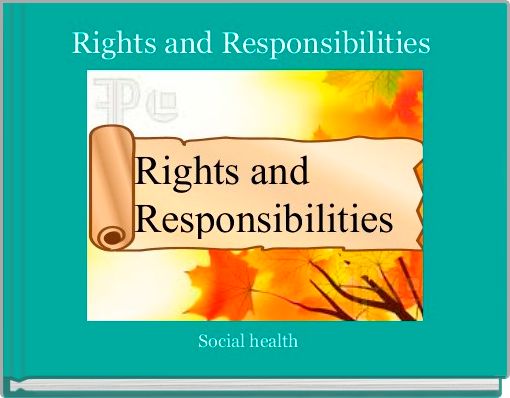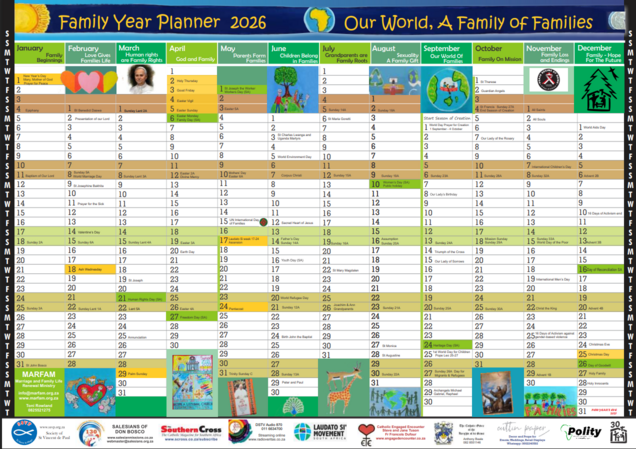MARCH overview. Family Rights and Responsibilities; a Lenten focus. The right to life should be paramount and in some form it is enshrined in most national Constitutions, the UN Declaration of Human Rights and the Church’s Charter of Family Rights. All human life, as individuals, but also as family units, is precious from the first moment of existence until natural death. Rights extend to safety and protection from harm.
Concern for animal and plant life has become a growing concern and “extinction means forever” is a true consequence of lack of care and commitment. A culture of life approach should not only focus on the perspective of justice, but also of love and positive relationships. All of creation is interrelated. We can speak of the “butterfly effect.” “When a butterfly flaps its wings in Dublin the energy it sets in motion can result in a tornado in far-away Pietermaritzburg. This right to protection of life and fair treatment of all life forms as a universal right is still far from being realized today.
There is a strong focus on rights in society today. However every right should be balanced with a responsibility on the part of everyone; individual, family and other institutions have the responsibility to ensure that the particular right is upheld.
Underlying the principle of the common good is respect for the human person endowed with basic and inalienable rights. It has also to do with the overall welfare of society and the development of a variety of intermediate groups, especially the family as the basic cell of society. It calls for the welfare of society, social peace, stability and security provided by a certain order. Society as a whole, and the state in particular are obliged to defend and promote the common good. LS 157. The rights of some to free enterprise and market freedom cannot supersede the rights of peoples and the dignity of the poor, or respect for the natural environment, for to make something our own, it is only to administer it for the good of all. FT 122.
Setting the scene. Lent is about stock-taking, conversion and revisiting our relationships with God, one another and creation. It is also about performing acts of Love and Sacrifice. The three Catholic practices of Lent are prayer, fasting and almsgiving. Prayer, personal or communal, makes room for God in our lives. Fasting can mean denying ourselves, possibly something we particularly like, to share with others in need, or just as self-denial. Almsgiving is sharing with others some of our gifts, time, talents, money or other possessions.
See MARFAM LENTEN FAMILY CALENDAR. http://marfam.org.za/?s=eco-friendly+lenten+calendar+
Introduction. Lent begins on 2 March and continues until Holy Week and Easter from 10-17 April. Part 1 is included here and Part 2 of Lent will be included in April DAILY THOUGHTS. There are also other lists of suggestions.
- MARFAM LENTEN FAMILY CALENDAR with 60+ suggestions for ACTS OF LOVE AND SACRIFICE to choose daily or as appropriate to do individually or together towards becoming an eco-friendly family. They are relevant in the many different contexts of families. A separate sheet to download and print from http://marfam.org.za/?s=eco-friendly+lenten+calendar+
- LENTEN PRACTICES FOR THE HOME:
Study and Read: subscribe to eco-friendly newsletters on-line. Select topics of interest to study further on climate, biodiversity and living a simpler lifestyle. Read up on biomimicry. Read up on water saving, electricity saving, carbon footprints, healthy diets. Watch TV series and programmes on climate action and protection of creation around the world. Read up St Francis life and way of life and study Pope Francis writings especially Laudato Si’ and Fratelli Tutti as well as suggestions for the Amoris Laetitia Family Year.
Do: Do a family project on becoming eco-friendly: pray privately and together, do faith sharing ideally together. Hold a Family Reconciliation service and if possible Confession. Have a Family Prayer Meal. Pray STATIONS OF THE CROSS for Families from MARFAM in various languages. Check your family carbon footprint and make adjustments to reduce it. Save energy and water, grow herbs, vegetables, trees, eat more healthily – less meat, more vegetables. Support conservation projects for wild life, birds, bees, insects. Lobby about chosen issues – plastic pollution, environmental clean-up. Donate unused items to charity. Knit, sew, make items to donate to charity. Family fast days (Friday fast) to save money and donate to feeding projects. Exercise to keep fit.
Save money: Cut down on alcohol, smoking, fizzy drinks, junk food, bottled water, car use. Think twice before you spend, do clothes-swop rather than buy, buy in bulk and share. Have a meatless day. Donate money saved to Bishops’ Lenten Appeal. ,
Waste reduction: Recycle. Avoid single use plastics, styrofoam, avoid wasting food, compost food wastage.
Energy Saving: Do energy use check, switch off unnecessary and unused lights, TV and plugs. Use solar power, solar lights and rechargeable batteries. Cut time on TV, computer and cellphone to save energy and data.
Water saving: Use “grey” water from bath, shower and washing for toilets and garden. Don’t run taps when not needed. Collect rain water, use drip irrigation in garden or veggie patch.
Recycle: Join in recycling projects, plastic, paper, glass, make ecobricks out of plastic 2l bottles stuffed with plastic.
General: clean up environment, plant trees, support ecological campaigns in church, school and society. Make time for relationships and relaxation by cutting time on-line or cellphone.
Care for others: Befriend, share, give to poor and beggars, give away unused items, show care for sick and lonely
More Resources used in these DAILY THOUGHTS for promoting family spirituality during Lent: Catholic Church CHARTER OF FAMILY RIGHTS. SA Government BILL OF RESPONSIBILITIES FOR THE YOUTH OF SA. www.gov.za/about-government/government-programmes/bill-responsibilities. MORAL REGENERATION MOVEMENT https://static.pmg.org.za/150324MRM_Charter_of_Positive_Values.pdf







Recent Comments